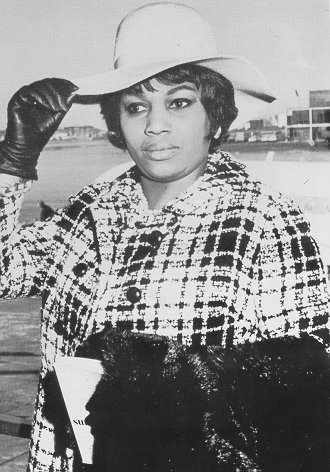Soprano Leontyne Price was born Mary Violet Leontine Price in Laurel, Mississippi, on February 10, 1927, the daughter of James and Katherine Price. Leontine was a very musical child and became a local success at an early age, singing at local weddings and funerals. After receiving local training, she sang in her first recital on December 17, 1943.
After studying at Wilberforve College (now Central State University) in Ohio, Leontine enrolled in the Juilliard School of Music in New York. She began studying with Florence Page Kimball and, shortly after changing the spelling of her name to “Leontyne”, she was accepted into the Juilliard Opera Workshop. Much of Leontyne’s musical education was supported by a wealthy family from Laurel, Alexander and Elizabeth Chisolm.
At Juilliard, she appeared in 1952 as Nella in Gianni Schicchi and and, later that year, as Mistress Ford in Falstaff. Also in 1952, she was invited by composer Virgil Thompson to appear as Saint Cecilia in a revival of his Four Saints in Three Acts in New York and Paris.
Leontyne Price scored a major success when, in 1952, she appeared as Bess in Porgy and Bess in Dallas, Chicago, Pittsburgh, and Washington, D.C. In the production, Porgy was sung by William Warfield. After the final performance in Washington, Leontyne and William were married on August 31, 1952 (they separated in 1959). The following year, Porgy and Bess appeared in London, Paris, Vienna, Berlin, and then at the Ziegfeld Theatre in New York.
In January 1955, Price appeared in a telecast in Tosca with the NBC Opera Theatre. The performance was such a success that she was invited back for subsequent telecasts of The Magic Flute, Dialogues of the Carmelites, and Don Giovanni.
Leontyne Price made her debut with the San Francisco Opera in 1957 as Madame Lidoine in Dialogues of the Carmelites. During one performance, she was informed that Antonietta Stella had pulled out of performances of Aïda due to an emergency appendectomy. Price was invited to take her place, so she made her first performance on September 29, 1957. She was invited back to San Francisco for subsequent seasons as Leonora in Il Trovatore (1958) and as Donna Elvira in Don Giovanni (1959). On September 11, 1959, she opened the new season as Aïda (with Jon Vickers and Irene Dalis). Less than a month later, she appeared in San Francisco as the title character in the world premiere of Carl Orff’s The Wise Maiden.
In 1958, Price made her debut as Aïda at the Vienna Staatsoper and, on July 2 of the same year, she made her debut at London’s Royal Opera House as Aïda (with Regina Resnik as Amneris). In 1959, she made her debut with the Lyric Opera of Chicago as Liù in Turandot and returned later that season as the title character in Massenet’sThaïs. When the San Francisco Opera went on tour in Los Angeles in 1961, she appeared in Madama Butterfly (she sang her first Cio-Cio-San in Vienna in 1960).
After making her La Scala debut as Aïda on 21 May 1960, Price made her debut at the old Metropolitan Opera House as Leonora in Il Trovatore on January 27, 1961. Her debut was a phenominal success and, within the first nine weeks of her debut season, she had also appeared as Aïda, Donna Anna in Don Giovanni, Cio-Cio-San, and Liù. In October 1961, she opened the new Met season as Minnie in La Fanciulla del West. She returned to the Met during the 1963-64 season as Tatyana in Eugene Onegin and as Pamina in The Magic Flute. Her final new role at the “old Met” was that of Fiordiligi in Cosi fan tutte, which she performed for the first time on January 29, 1965 (the cast included Richard Tucker and Roberta Peters).
When the Metropolitan Opera moved to Lincoln Center in 1966, Price christened the new house as Cleopatra in the world premiere of Samuel Barber’s Antony and Cleopatra. The following year, she celebrated 10 years with the San Francisco Opera with a performance of Un Ballo in Maschera. On February 2, 1968, Price made her debut at the Paris Opera as Aïda. Maria Callas, who attended one of the performances, was so impressed that she invited Leontyne for dinner. She returned to San Francisco to open the new opera season on September 13, 1968, as Elvira in Ernani.
Price opened the 1969-70 season at the Metropolitan Opera as Aïda and, in 1974, she opened the San Francisco opera season in her role debut as Manon in Manon Lescaut. She repeated the role of Manon at the Met the following year.
During the 1970’s, Leontyne Price appeared in several memorable productions, including performances of La Forza del Destino at the Met with Carlo Bergonzi in 1972, andIl Trovatore in Vienna with Luciano Pavarotti in 1977. On January 3, 1985, Leontyne Price made her farewell to opera with a performance of Aïda at the Metropolitan Opera.
Price continued to appear in recitals and concerts until early-2000, when she gave notice to her management that she now considered herself completely retired. During her illustrious career she was awarded the NAACP’s Spingarn Medal and the Presidential Medal of Freedom. She has also taken part in many recordings, which ensure her continued popularity among opera-lovers for years to come.
